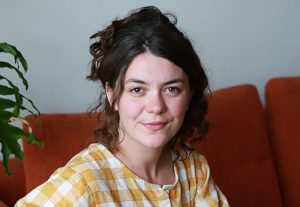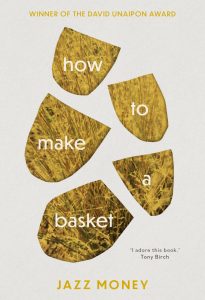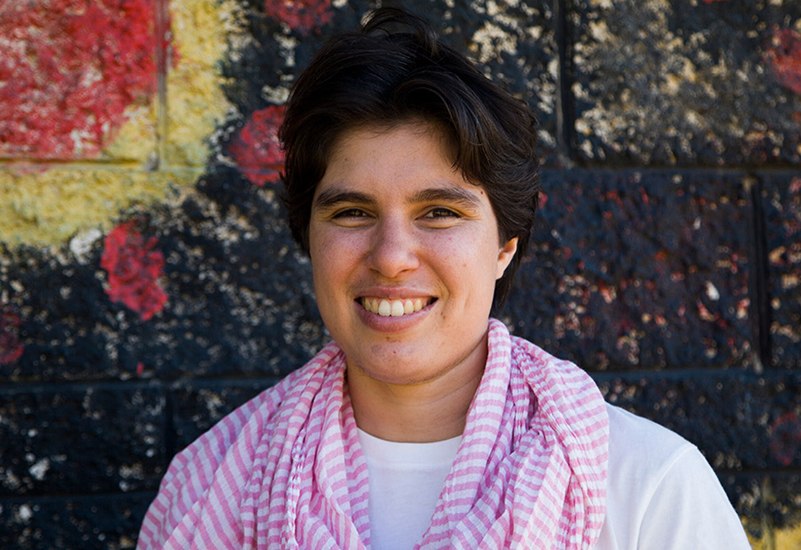Multiple award-winning author Ellen van Neerven shares about why, as an editor, they want writers that they’re working with to distrust them! Ellen discusses the importance of having more First Nations representation in the publishing industry and ensuring that first-time authors feel empowered during the editing process, as well as the experience of editing writer Jazz Money’s debut work, How to make a basket. Ellen, of Mununjali and Dutch heritage, and Jazz, of Wiradjuri heritage, feature on episode #03 of the Author/Editor video series – 10 online videos which explore the creative dynamics between writers and editors.
You credit the black&write! project for your entry into editing and your formative development as an editor. black&write! is a highly successful initiative that has helped launch the careers of both writers and editors. What made you decide to become a trainee editor (rather than pursue further mentorship opportunities as a writer?)
The black&write! Project traineeship was an opportunity I received when I had just graduated from a BFA (Bachelor of Fine Arts) in Creative Writing. I was a sponge, and wanted to soak up as much experience as I could. At the time, I didn’t have much confidence in my own creative writing. To tell the truth, my fiction, at the time, was average. No-one had told me I had any sort of promise.
What was clear during the BFA at QUT, was that I had a passion for being around words and I wanted this to be part of my future. I had also done some classes in editing in my degree, and I enjoyed it, and as a peer tutor, I was also helping students revise their work, which I found fun and interesting. When I found out about the black&write! project and how there were two inaugural trainee editor positions there, I interviewed for the job. During the interview, I realised how much I wanted the traineeship. It felt right, like a natural fit.
You’re a highly esteemed author and writer and very prolific – I think you’ve won more than a dozen literary awards in less than a decade! Very impressive. As a young person, what was it like to win your first award – the David Unaipon award in 2013?
I had coffee with former UQP editor and Associate Professor Sandra Phillips recently, and she told me an interesting stat about myself: I was the first Unaipon winner born after the Unaipon Award was established in 1988/89. I was born in 1990, which was the year the first award-winning book, the last Graeme Dixon’s Holocaust island was published. It goes to show the legacy of the award. I felt like I was joining a family.
In the episode #03 of the Author/Editor series, Jazz sang your praises as an editor. She also said that her experience of working with you was akin to working with a mentor, as you broadly mentored her through the process of being a first-time author. Do you feel that editors or publishers have a duty of care to first-time writers? What would that roadmap look like?
I know some publishing houses have author kits that explain the process to first-time writers. I’ve just been on the ASA publishing industry FAQs page and that has lots of great information and visuals too. The question is, how do we translate the information as editors and publishers into conversations with writers from the outset? This is an industry that has a history of exploitation and mistreatment. I think best practice could start with a conversation where the process is demystified and the author has the opportunity to ask questions and advocate for themselves and their individual needs.
Jazz said she was really grateful to UQP for being paired with you, and as a result of your support, she now has the vocabulary and knowledge to advocate for herself moving forward. As writing poems can be a very internal process, she actually looks forward to the collaborative aspect of working with an editor. Do you feel that as an industry, editors and publishers should think in terms of giving first-time writers a positive experience?
 I am happy that Jazz feels strong, knows her worth and is excited about working with an editor again. It’s horrible when a writer dreads working with an editor because of an unsavoury experience but it happens a lot. There can be residual pain and discomfort there. Sue Abbey taught me that the gold standard is to work with a writer so that they are supported on the current book, and through the process, feel like they have gained tools and skills to bring to the next book. In fewer words: edit the author with their next book in mind. She taught me it is about working with writers as people as opposed to working on books.
I am happy that Jazz feels strong, knows her worth and is excited about working with an editor again. It’s horrible when a writer dreads working with an editor because of an unsavoury experience but it happens a lot. There can be residual pain and discomfort there. Sue Abbey taught me that the gold standard is to work with a writer so that they are supported on the current book, and through the process, feel like they have gained tools and skills to bring to the next book. In fewer words: edit the author with their next book in mind. She taught me it is about working with writers as people as opposed to working on books.
During the video, you said the following when you were first meeting Jazz: “I kind of wanted Jazz to mistrust me and to have an element of distrust because I think that’s important.” This feels unusual, as the attitude in the publishing industry can often be that the editor “knows best”. Can you unpack your statement a little?
It does seem counterintuitive to say I want my author to mistrust me. Isn’t trust the essential ingredient of an editor-writer relationship, you might ask? It is, but trust can go too far. A writer may trust everything an editor says which may make them start to doubt themselves, when they are the expert of their own work. I am hinting that writers and editors both need to be aware of their positionality and biases. Yes, a writer should consider what an editor has to say but also question what is being suggested and where it is coming from.
You said that you’d like to see more diverse representation in publishing – to see more Aboriginal and Torres Strait Islander-owned publishing houses and have more Indigenous writers work in mainstream publishing houses as well. What sort of changes would need to happen in the industry for that sort of progress to be made?
I don’t feel I have the authority or expertise to answer this question. But yes, to match the contributions of our amazing authors, I would love to see more entry, mid-career and senior positions for First Nations people in the industry, and I think it would be really healthy for our industry if we increased the number of Aboriginal and Torres Strait Islander-owned publishing houses in Australia. A 2016 article suggests we have four Indigenous publishing houses in Australia (out of about 450). Which is less than 1%. Comparatively, Canada has eight (out of about 500). A lot must be done. I think, most importantly, non-Indigenous people need to make a commitment to justice, to improve our industry and make it more diverse in terms of who works in publishing, who is listened to and who benefits. It needs to be equitable.
What’s it like to juggle being a writer and editor? Do you feel that being a writer makes you a better editor, or an editor a better writer?
I have experiences related to my own writing I can relay to the writers I work with. I’m always thinking laterally. I’m always reading. I’m always thinking and reflecting on how to be a better editor, mentor, teacher and writer. In saying that, I need periods of retreat, where I live weeks without words and spend heaps of time outdoors. This helps recharge the batteries.
Who have been the biggest influences in your career and why? (In the video, you mentioned Sue Abbey and Aunty Linda McBride.)
Sue Abbey and Aunty Linda (McBride) are my ultimate influences. I feel they are always beside me when I’m editing. The late Aunty Kerry (Kerry Reed-Gilbert, First Nations Australia Writers Network founder and writer). Jeanine Leane. Sandra Phillips. Every author I have ever worked with. These people have taught me a lot about editing. I am also learning a lot about the development of work through writing for the stage. This is a highly collaborative process where things are worked on the floor, and I’m grateful for this, as it reminds me that we are instinctual story creatures.
Winning the David Unaipon Award for Heat and Light helped launch your career, and the first book you edited was the verse novel, Ruby Moonlight by Ali Cobby Eckermann. About six or seven years later, you were then the editor for a book of poetry, How to make a basket, which won the David Unaipon award. How does it feel to come full circle?
 The verse novel Ruby Moonlight (Magabala, 2012) by Ali Cobby Eckermann was the first book I worked on while at black&write! What an amazing experience that was! It is a beautiful book, so tender, so terse. Words pushed to their maximum impact. Ali had already written a few books before this one, and she taught me so much.
The verse novel Ruby Moonlight (Magabala, 2012) by Ali Cobby Eckermann was the first book I worked on while at black&write! What an amazing experience that was! It is a beautiful book, so tender, so terse. Words pushed to their maximum impact. Ali had already written a few books before this one, and she taught me so much.
There’s been a few poets I have worked with since, including the amazing Alison Whittaker. And a couple of anthologies including Homeland calling (Hardie Grant and Desert Pea Media, 2020) and Best of Australian poems (Australian Poetry, co-edited with Toby Fitch, 2021).
Recently, I worked on two poetry collections, Dropbear by Evelyn Araluen (UQP, 2021) and How to make a basket (UQP, 2021) by Jazz Money, as a freelance editor. These are dynamic books by two first-time writers. Incredible works. It was such an honour. I love my job. My approach is to nurture the space in which the poetry manuscript can be what it needs to be.
For tickets to episode #03 of the Author/Editor series with Jazz Money and Ellen van Neerven to go the Brisbane Writers Festival page. For more information about the Author/Editor series and the exciting line-up planned for 2022, visit BWF’s online events page.

